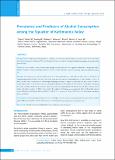Please use this identifier to cite or link to this item:
https://hdl.handle.net/20.500.14356/1731| Title: | Prevalence and Predictors of Alcohol Consumption among the Squatter of Kathmandu Valley |
| Authors: | Thapa, P Mishra, S R Pandey, A R Belbase, P Acharya, C Bista, B Ghimire, N Aryal, K K |
| Citation: | ThapaP., MishraS. R., PandeyA. R., BelbaseP., AcharyaC., BistaB., GhimireN., & AryalK. K. (2016). Prevalence and Predictors of Alcohol Consumption among the Squatter of Kathmandu Valley. Journal of Nepal Health Research Council. https://doi.org/10.33314/jnhrc.v0i0.720 |
| Issue Date: | 2016 |
| Publisher: | Nepal Health Research Council |
| Article Type: | Original Article |
| Keywords: | Alcohol consumption Kathmandu valley Nepal Predictors Urban poor |
| Series/Report no.: | Jan-April, 2016;720 |
| Abstract: | Abstract Background: Alcohol consumption has grown up sharply over the past decades in Nepal. Conversely, little is known about this phenomenon among the urban poor. We assessed pattern, frequency, context, and type of alcohol consumption among the urban poor of Nepal. Methods: We executed a cross-sectional study, taking 422 households from four squatter settlements of Kathmandu Valley. Modified Nepalese version standard questionnaire was used for data collection. Data was objectively analyzed in SPSS full version 19. Results: The study reported 39.81% (95% CI: 32.41-47.21) current drinkers, with male (65.99%, 95% CI: 57.85-74.13) outnumbering female (16.89%, 95% CI: 4.98-28.80). One out of ten drinkers drank daily (male: 13.08%, female: 13.16%). A third (30.36%) of all current drinkers acknowledged drinking more than one type of alcohol (male: 28.46%, female: 36.84%). Nearly half (47.60%) of the drinkers drank in social gathering (male: 47.90%, female: 47.60%). Home was the place of drinking for nearly one-fifth (18.60%) of the drinkers. Males most commonly drank alcohol with their friends (34.60%), whereas female drank with family members (25.60%). Nearly half of the drinkers drank during evening hour (45.24%). Multivariable analysis detected likelihood of drinking 5.86 times (95% CI: 2.50-13.72) in male and 3.16 times (95% CI: 1.39-7.13) in those with family history of alcohol. Conclusions: We found high prevalence of alcohol consumption than the national average among the urban poor with a marked gender difference by pattern. Gender sensitive alcohol prevention and control programs need a greater start. Keywords: Alcohol consumption; kathmandu valley; nepal; predictors; urban poor. |
| Description: | Original Article |
| URI: | http://103.69.126.140:8080/handle/20.500.14356/1731 |
| ISSN: | Print ISSN: 1727-5482; Online ISSN: 1999-6217 |
| Appears in Collections: | Vol. 14 No. 1 Issue 32 Jan - Apr 2016 |
Files in This Item:
| File | Description | Size | Format | |
|---|---|---|---|---|
| 720-Article Text-1355-2-10-20160608.pdf | Fulltext Download | 215.63 kB | Adobe PDF |  View/Open |
Items in DSpace are protected by copyright, with all rights reserved, unless otherwise indicated.
